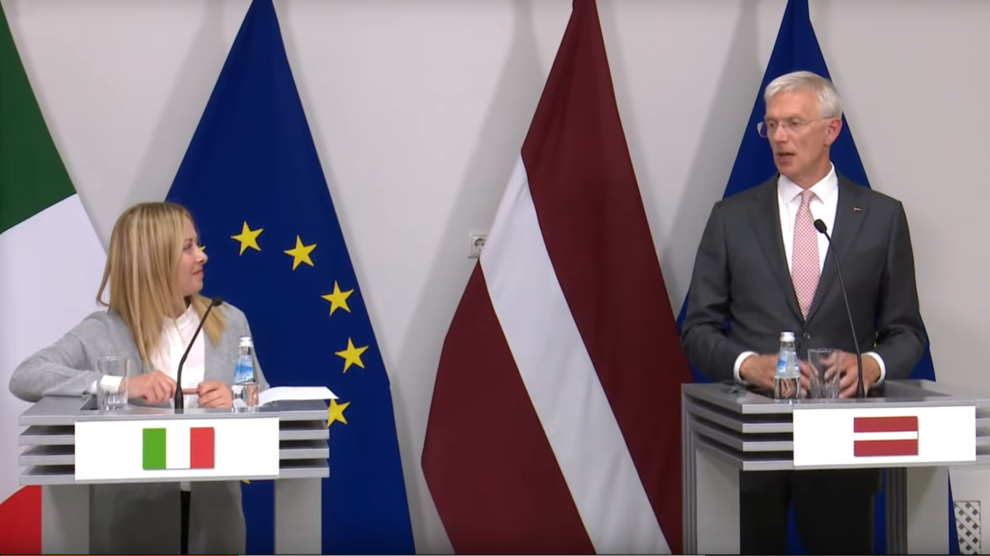The Riga stop ahead of Vilnius. On Monday, Italian Prime Minister Giorgia Meloni flew to Riga to meet with her Latvian counterpart, Krišjānis Kariņš (the first such meeting since 1998) ahead of the NATO Summit Tuesday through Wednesday. Alongside her were the Foreign and Defence Ministers, Antonio Tajani and Guido Crosetto, who met with his homologue Ināra Mūrniece and visited the Italian contingent stationed in Latvia as part of the Alliance’s “Baltic Guardian” operation.
- As the Latvian PM explained, he and his Italian homologue found themselves in agreement across the board and especially on strengthening NATO to support the democracies, “360-degree support for Ukraine” (in the words of PM Meloni) and protecting the EU’s external borders.
- The Italian PM also stressed the EU’s need to up its defence investments, nodding at her and other countries’ request that they be excluded from fiscal rules alongside those on the ecological and digital transition.
NATO goes global. As Italy’s Permanent Representative to NATO, Ambassador Marco Peronaci, wrote on our sister website, allies will use the Vilnius Summit to “take strategic decisions that will lead not only to the strengthening of assets but to an overall reorganisation with a medium- to long-term view.” That, he stressed, includes “all-round dialogue” and “political partnerships” with other actors in the name of cooperative security.
- It is no coincidence that Asia-Pacific partners – Australia, Japan, the Republic of Korea and New Zealand – will attend the Lithuanian summit, as he pointed out.
- Allies will also discuss the strengthening of partnerships with countries on the Southern flank, which NATO “has been pursuing for several years through programmes such as the Mediterranean Dialogues and the Istanbul Cooperation Initiative” and even operative missions, such as the one in Iraq, “which is evolving from a purely defensive presence to a partnership activity for internal security reform with full Iraqi ownership.”
Watch out for the South. FM Tajani – who in Vilnius will meet with his colleagues from across NATO as well as from Bosnia-Herzegovina, Georgia and Moldova, and the EU High Representative for Foreign and Security Policy Josep Borrell – remarked that the repercussions of Russia’s war against Ukraine are rippling across “the entire Euro-Atlantic region, including our Southern flank.”
- “The political and economic stability of North Africa, the Middle East and the Sahel is severely undermined by growing food instability, the resurgence of terrorism, irregular migration flows, the impact of climate change and, last but not least, the negative influence of external powers,” he said.
Italy’s take on the future of the Alliance. The pre-Vilnius conclusions of the Italian Atlantic Committee’s reflection paper push NATO to “once again resort to its historical capacity for ‘adaptation’ and to implement the NATO Strategic Concept with an innovative and forward-thinking vision.” The Alliance, it argues, should “not only focus on the rear-mirror to address the ‘direct threat’ posed” by Russia, but also strive to “adopt the necessary tools to effectively respond to the new ‘challenges’ posed by China in a complex, multipolar, multidimensional, and multi-domain security environment.”
- NATO must be more ambitious, expand on its strategic partnership with the EU, “fully recover its original political vocation” and “become the attractive pole of a new West,” one founded on “values and respect for the rule of law” through international coordination with partners “that share the same democratic and freedom-based ecosystem,” argue the authors.
What Rome brings to the table. In this optic, Italy – thanks to its geographical position and diplomatic prowess within the enlarged Mediterranean and beyond – can carve out a bigger role and host increasingly important NATO structures, reads the paper, balancing out other EU nations and offering US partners a solid platform for projection within the Old Continent’s dynamics.
- Italy already participates in several NATO battlegroups across the Eastern Flank, ranging from Latvia to Bulgaria, as well as the Balkans, and hosts important NATO Commands and US bases.
- Regarding the 2% of GDP threshold for defence spending, Rome will reiterate its commitment to reach it. It will also call to strengthen the common EU defence project, rationalising defence spending and avoiding duplicates so as to make NATO’s European pillar more efficient.
Image: livestream of the Italian PM’s Office




